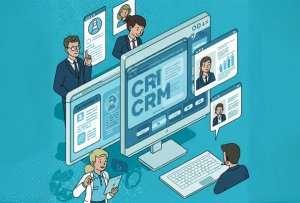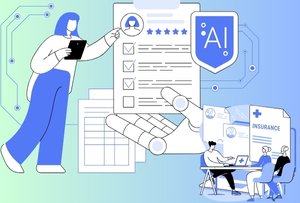At Experion, we help insurers stay ahead of the curve by building intelligent digital solutions that turn everyday processes into powerful customer experiences. Our Product Engineering expertise allows insurance providers to evolve faster, operate smarter, and deliver the kind of service modern policyholders expect.
Today’s insurance customer doesn’t want to wait on hold, fill out stacks of paperwork, or chase updates across disconnected channels. They expect the same level of speed, personalization, and convenience they experience with ride-hailing apps, food delivery platforms, and online shopping. And if they don’t get it, they won’t think twice about switching providers.
This shift isn’t a trend; it’s a tipping point. For insurers, the challenge is no longer just offering coverage but delivering an experience that feels effortless, responsive, and relevant at every stage of the customer journey.
That’s where insurance CRM software comes in.
Far from being just a database of contacts, a modern CRM acts as the customer intelligence layer of the business, enabling meaningful engagement and proactive service. It connects sales, service, marketing, and claims into one cohesive workflow. It gives teams a full picture of the customer. It automates the follow-ups that often slip through the cracks. And most importantly, it gives insurers the tools to be proactive rather than reactive in a competitive landscape.
In this blog, we’ll explore what makes CRM software for insurance essential, how it differs from traditional systems, and why forward-thinking insurers are already building their future around it.
What is Insurance CRM Software?

Insurance CRM software is a purpose-built solution tailored specifically to the needs of insurance providers, be it agencies, brokers, or carriers. Unlike generic CRM platforms, this specialized tool is deeply attuned to the intricacies of the insurance landscape, offering features that align with sector-specific requirements.
At its core, an insurance CRM serves as a central hub that manages the full spectrum of customer relationships. From lead generation and policy management to claims tracking and customer support, every interaction is captured and analyzed within a single system. This not only reduces information silos but also empowers teams with real-time insights, making every customer engagement more informed and meaningful.
Some key capabilities of modern insurance CRM platforms include:
- Policy Lifecycle Tracking: Manage applications, quotes, issuance, and renewals in a unified dashboard.
- Automated Workflows: Route tasks, send reminders, and trigger communication based on predefined conditions.
- Customer Segmentation: Group clients based on behavior, demographics, and policy history to tailor messaging.
- Claims Management: Track claims efficiently while keeping customers updated.
- Sales Pipeline Management: Help agents visualize and manage their sales funnels with better forecasting.
Difference Between Insurance CRM Software and Agency Management System (AMS)
In the insurance world, both Insurance CRM software and Agency Management Systems (AMS) play vital roles in improving efficiency and streamlining operations. However, they serve distinctly different functions. While they may sometimes overlap in capabilities, the core focus of each system is what truly sets them apart.
|
Aspect |
Insurance CRM Software | Agency Management System (AMS) |
|
Primary Focus |
Managing and enhancing relationships with current and potential clients |
Managing core agency operations and policy workflows |
|
Main Activities |
Lead generation, sales, marketing automation, customer engagement, and retention |
Policy administration, claims processing, compliance, document, and commission management |
| Contact Management | Centralized client and prospect database with communication history |
Focused on storing client data linked to policy records |
|
Lead Management |
Tracks leads through sales pipelines | Not typically designed for lead nurturing |
| Sales & Marketing | Automates campaigns, email sequences, follow-ups |
Not a core function |
|
Communication Tools |
Manages emails, calls, and SMS for client engagement | Limited communication tools, mainly operational notifications |
| Quoting & Proposals | Often integrates with quoting tools for quick proposal generation |
Focuses more on submitted quotes and issued policies |
|
Customer Segmentation |
Groups clients for targeted outreach | Generally lacks advanced segmentation features |
| Policy Management | May track policies, but not the core function |
Central feature, including renewals, endorsements, and cancellations |
|
Claims Management |
Might assist with communication during claims | Full claims tracking and processing workflows |
|
Commission Tracking |
May include basic sales tracking |
Tracks agent commissions in detail |
| Compliance | Limited features, if any |
Provides compliance tools to meet regulatory standards |
|
Reporting & Analytics |
Focused on sales performance, customer engagement, and marketing effectiveness |
Focused on operational metrics, policy data, commissions, and agency productivity |
|
System Analogy |
Sales and marketing hub—helps you find, win, and keep clients |
Central operating system—manages policies, operations, and compliance |
Why You Might Need Both
Choosing between an Insurance CRM and an AMS isn’t always an either-or decision. They may serve unique roles, but they perfectly complement one another. The CRM software for insurance keeps your customers engaged and your pipeline growing. The agency management system, meanwhile, makes sure those policies are managed effectively behind the scenes. Together, they create a complete ecosystem for success, balancing customer experience with operational excellence.
Why the Insurance Industry Needs CRM Solutions

The insurance industry has undergone significant transformation. In today’s hyper-connected world, policyholders expect nothing less than fast, personalized, and seamless service, whether they’re buying a new policy, filing a claim, or simply seeking information. This shift has created a need for insurance businesses to rethink how they manage customer relationships.
Insurance CRM software has emerged as a crucial tool in this transformation. It empowers insurers to centralize data, improve communication, automate tasks, and provide the kind of service that builds loyalty and trust. With rising competition and growing regulatory requirements, CRM software for insurance isn’t just a convenience; it’s a strategic necessity.
Challenges Faced Without a CRM
Insurance providers who still rely on outdated systems or manual processes face several operational and customer experience roadblocks. Here’s what goes wrong without a robust insurance CRM:
Disorganized Data
When customer information is scattered across spreadsheets, email threads, and separate platforms, it’s difficult to get a unified view of the client. Agents may struggle to find important data, leading to delays, errors, and missed opportunities. Without insurance CRM software, this fragmented data environment stifles customer insight and decision-making.
Poor Customer Follow-Up
A lack of systemized tracking for customer interactions means agents can easily miss follow-ups or forget to respond promptly. This results in cold leads, frustrated customers, and a decline in sales conversions. In today’s environment, delayed responses can cost more than just a sale; they can cost customer trust.
Inefficiency in Daily Operations
Manual entry, scattered tools, and repetitive tasks slow agents down and reduce overall productivity. Instead of building relationships or closing deals, employees spend time on low-value tasks. Without streamlined workflows and automation, agencies fail to scale their operations or compete with more agile players in the market.
Key Features of a Robust Insurance CRM
A well-implemented CRM software for insurance offers targeted solutions to overcome these challenges and create a foundation for long-term success. Here are the essential features that make a CRM truly effective for the insurance sector:
- Lead Management and Nurturing
The CRM should capture leads from multiple sources—such as websites, referrals, and campaigns—and automatically assign, prioritize, and nurture them through personalized messaging and timely follow-ups. Automated workflows can dramatically improve response time and increase conversion rates.
- Policy and Claims Tracking
Integrating client profiles with their policy and claims history gives agents full visibility into the customer’s journey. This linkage allows for better service, faster issue resolution, and tailored recommendations, especially when managing renewals or upselling new products.
- Customer Communication Tracking
A centralized log of all email, SMS, and phone communications ensures agents are never in the dark. With every interaction documented, anyone accessing the profile knows the full history, allowing for more personalized and contextual engagement—an important hallmark of modern insurance software.
- Automated Reminders and Workflows
Setting up automatic alerts for policy renewals, claim status updates, and follow-ups ensures nothing falls through the cracks. Automation frees up agents from routine tasks and improves overall responsiveness and client satisfaction.
- Integration with Other Tools
A high-quality insurance CRM should connect effortlessly with policy administration systems, marketing platforms, quoting tools, and more. This ensures a seamless exchange of data across systems, reducing redundancy and enhancing workflow efficiency. Integrating AI into CRM can further elevate this, with predictive analytics and intelligent task prioritization.
- Analytics and Reporting
From lead conversion ratios to agent productivity and campaign performance, CRM analytics offer insights that drive smarter decisions. Managers can identify trends, optimize strategies, and keep a close watch on business health with data-rich dashboards.
At the core of Experion’s approach is a commitment to solving real business problems with scalable, intelligent technology. We’ve helped global insurers automate lead nurturing, unify fragmented data systems, and introduce AI-driven insights into daily workflows, resulting in higher productivity and stronger customer connections.
Benefits of Using CRM Software for Insurance

Implementing a robust insurance CRM software solution is more than a technological upgrade—it’s a strategic investment that reshapes how insurance agencies engage with clients, manage operations, and grow sustainably. From optimizing workflows to enhancing customer experience, the right CRM can deliver measurable benefits across the board.
- Improved Customer Retention and Satisfaction
A CRM helps agents understand each policyholder better by providing a comprehensive, 360-degree view of customer history, preferences, and policies. This allows for personalized communication and proactive service, building deeper relationships that drive loyalty. Satisfied customers are more likely to renew, refer others, and remain with the agency for the long haul.
- Enhanced Productivity and Efficiency for Agents
Agents no longer need to juggle between multiple systems or waste time on manual data entry. With CRM software for insurance, routine tasks like sending follow-up emails, scheduling reminders, and updating contact records are automated. Easy access to client information and pre-built workflows frees agents to focus on high-value tasks—like converting leads and offering tailored policy recommendations.
- Streamlined Onboarding and Sales Processes
An insurance CRM transforms how new clients are onboarded. From lead capture and qualification to policy issuance, the entire sales journey becomes seamless and efficient. Automating these stages reduces turnaround time, eliminates bottlenecks, and increases the chances of successful conversions. It also ensures consistency in customer experience regardless of the agent handling the process.
- Better Data Insights and Decision-Making
With centralized data and powerful analytics tools, businesses can gain a deeper understanding of what’s working and what needs improvement. Whether it’s identifying top-performing agents, analyzing customer demographics, or tracking campaign effectiveness, an insurance software solution with CRM capabilities supports smarter, more informed decision-making.
- Compliance with Industry Standards
The insurance sector is heavily regulated, and non-compliance can be costly. Many insurance CRM systems come equipped with features like communication logs, documentation tracking, and secure audit trails that simplify compliance with data privacy laws and industry regulations. This not only reduces risk but also ensures operational transparency.
How to Choose the Right Insurance CRM Software

Not all CRM solutions are created equal. Selecting the right one for your insurance business involves evaluating several critical aspects to ensure it aligns with your current needs and future goals.
Scalability
Your business is dynamic, and your insurance CRM software should be able to grow with it. Look for platforms that can handle an increasing number of users, expanding datasets, and evolving feature needs without losing performance. Scalable solutions save you from the hassle and cost of frequent system replacements.
Integration Capabilities
The best CRM platforms don’t work in isolation. Ensure the system integrates easily with your existing technology stack, whether it’s a policy administration platform, marketing automation tool, quoting engine, or communication channels like email and SMS. Integrating AI into CRM further enhances capabilities, enabling predictive analytics and intelligent recommendations that boost overall performance.
Ease of Use
Even the most powerful CRM won’t deliver value if it’s too complex to use. Choose a system with a clean, intuitive interface that agents and staff can learn quickly. High usability ensures better adoption, which means more consistent usage and better returns on your investment.
Security and Compliance
Handling sensitive customer data means your CRM must be secure by design. Opt for solutions that offer strong encryption, role-based access control, secure authentication, and compliance with global data protection laws such as GDPR or HIPAA. A trusted CRM software for insurance should help protect against data breaches and support audit readiness.
The Future of Insurance CRM Software

The future of insurance CRM software is being shaped by cutting-edge technologies that promise smarter, more personalized, and more efficient systems for insurers. These advancements are setting the stage for transformative customer experiences and deeper operational intelligence.
AI and Automation in Insurance CRM
Artificial intelligence and automation are redefining how insurance CRM solutions operate. By eliminating repetitive tasks, personalizing communication at scale, and improving responsiveness, AI is becoming central to the modern CRM experience.
AI-powered chatbots can now manage routine customer queries, enabling round-the-clock support while allowing agents to focus on complex cases. Automation can handle lead nurturing workflows, schedule policy renewal reminders, and even initiate elements of claims processing within the CRM. In addition, AI is enhancing internal efficiency by processing documents and extracting data with high accuracy, reducing human effort and errors.
Predictive Analytics and Customer Behavior Modeling
As CRM software evolves, predictive analytics is playing a larger role. By analyzing historical customer data, demographic insights, and behavioral patterns, modern systems are capable of forecasting future customer actions.
For example, insurers can identify clients at risk of leaving, pinpoint the best timing for upselling additional policies, or predict which services a customer might need based on life events. This helps insurers approach customers proactively, rather than reactively, delivering more timely and relevant engagement. Predictive analytics transforms a traditional CRM into a forward-looking tool that anticipates needs and supports growth.
Integration with Telematics and IoT for Insurers
The integration of telematics and Internet of Things (IoT) devices with insurance CRM software opens up new opportunities for personalized risk assessment and customer engagement.
Telematics devices, such as those in cars, provide driving behavior data that insurers can use to offer usage-based insurance plans. Similarly, IoT sensors in homes can give insurers early warnings about risks such as water leaks and fires. When this data feeds into a CRM system, it allows for proactive communication, personalized policy adjustments, and tailored risk mitigation advice. This not only enhances the customer experience but also leads to more accurate pricing and reduced losses for insurers.
Conclusion
Choosing the right insurance CRM software is not just a matter of operational convenience. It has become a strategic priority for insurance businesses aiming to thrive in a customer-first, digital-first world. A good CRM system enhances customer satisfaction, boosts agent productivity, ensures compliance, and delivers valuable insights through centralized data and analytics.
As technology continues to evolve, the integration of AI, predictive analytics, and connected devices will unlock even greater potential. CRM platforms will not just store information but act as intelligent systems that guide engagement, anticipate needs, and streamline decision-making.
To remain competitive and responsive, insurance organizations must look beyond traditional tools and embrace CRM solutions that are scalable, secure, and future-ready. The insurers who make the right investments today are the ones who will lead tomorrow’s market with stronger relationships and smarter operations.
Key Takeaways
- Insurance CRMs unify sales, service, and claims into one workflow.
- Customers expect digital-first, fast, and personalized service.
- Purpose-built CRMs outperform generic platforms in insurance use.
- CRMs focus on engagement; AMS handles core policy operations.
- Using both CRM and AMS deliver complete operational synergy.
- Disorganized data leads to missed follow-ups and lost sales.
- Automation boosts agent efficiency and improves response time.
- AI-driven CRMs enable predictive service and proactive outreach.
- CRM analytics support smarter, real-time decision-making.
- Scalable, secure CRMs are key to staying competitive.
Experion is trusted by insurers worldwide to design and deliver the next generation of digital tools. From custom CRM development to full-scale system integrations, we help future-proof your business and redefine what’s possible in customer relationship management.

